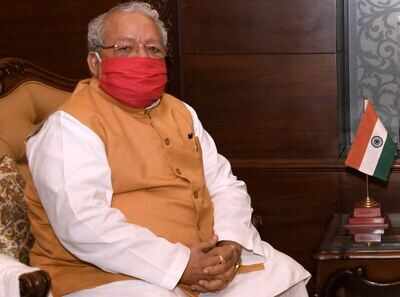
NEW DELHI: After former Rajasthan deputy chief minister Sachin Pilot’s rebellion against the Congress leadership, the state’s political drama is being fought not just in the courts but also in the Raj Bhavan.
Rajasthan chief minister Ashok Gehlot has already petitioned governor Kalraj Mishra for convening an assembly session. Governor Kalraj Mishra rejected Gehlot’s letter stating that it did not mention anything about the confidence motion.
In his reply to Gehot, the governor has put three conditions for the next draft of an assembly session proposal. They are a 21-day notice, live broadcast of the floor test if it is held and social distancing in the assembly in view of the COVID-19 pandemic.
The Congress has come down heavily on Mishra and expressed astonishment and anguish.
Former Union minister P Chidamaram said the governor is only a formal instrument to sign and issue summons to the MLAs. A chief minister accused of not enjoying majority is entitled to call a session at the earliest to prove his majority, he said.
“We are astonished and anguished by the attitude of the governor. We are, therefore, protesting today before all Raj Bhavans in the country to highlight the gravity of the issue and draw the people's attention to violations of the Constitution,” he added.
On the other hand, the BJP is solidly backing the governor. A delegation of the BJP’s Rajasthan unit met the governor late on July 25 evening and hit out at Gehlot. They condemned the CM’s threat of picketing the Raj Bhavan if the governor did not convene an assembly session soon.
Like the two diametrically opposite opinions of the Congress and BJP leaders, constitutional experts are also hold contrarian opinions on the issue.
Subhash C Kashyap
Former secretary general of the Lok Sabha Subhash C Kashyap told the timesofindia.com that the Constitution is supreme and is binding on the executive, the legislature and also the judiciary.
He said, “Article 163 of the Constitution is very clear. It explains the position of the governor in most of the matters.”
Kashyap said the governor acts on the advice of the council of ministers. “However, in certain matters, he acts at his own discretion,” he said.
He said even the Constitution remains silent over the discretionary powers that a governor enjoys.
Kashyap said, “There are certain matters for the governor to decide himself. Pratap Singh versus Governor of Goa 1999 is very clear that a governor’s acts in his discretion are not subject to judicial review.”
“Under these circumstances, chief minister Ashok Gehlot should accept that it is the governor and governor alone to decide when to summon an assembly session.,” he said.
Kashyap had a piece of advice for Gehlot as well. “Whatever the Rajasthan CM is doing - like sitting in a dharna outside the Raj Bhavan, is unseemly. It is not expected from a gentle man,” he added.
PDT Achary
Former Lok Sabha secretary general PDT Achary is of the opinion that it is the government which decides the date of summoning an assembly session when the chief minister enjoys majority. The governor has to go by the date advised by the government.
He said the discretionary powers of the governor come into play only if the CM loses or the majority lies with the council of ministers.
Achary said in the case of Rajasthan, the CM enjoys a majority. Gehlot has met the governor in the Raj Bhavan and showed the numbers. Therefore, the governor has to act according to the advice of the council of ministers.
“Under the Constitution, the governor has to act on the advice of the council of ministers. Once the council of ministers takes a decision, the governor has to follow it. At the most, he can seek explanations… We have a cabinet form of government. The governor has to act on the advice of the council of minsurers,” he said.
Buttressing his point, Achary said if the governor has any issues - for example safety of MLAs and others in the wake of COVID-19 - he can seek clarifications from the government. If the governor is satisfied with the reply of the government, he cannot refuse to settle the date of summoning the assembly session.
“Summoning the session of the assembly is a part of the executive. The decision of the council of ministers is binding on the governor. He has no other option but to accept the advice of the ministers,” he said.
Achary said the power vests in the elected government only because the governor is not personally responsible for anything which happens in the state.
As the council of ministers is responsible to the legislature, summoning an assembly session is also a power which is “entirely of the council of ministers”, Achary said.
Rajasthan chief minister Ashok Gehlot has already petitioned governor Kalraj Mishra for convening an assembly session. Governor Kalraj Mishra rejected Gehlot’s letter stating that it did not mention anything about the confidence motion.
In his reply to Gehot, the governor has put three conditions for the next draft of an assembly session proposal. They are a 21-day notice, live broadcast of the floor test if it is held and social distancing in the assembly in view of the COVID-19 pandemic.
The Congress has come down heavily on Mishra and expressed astonishment and anguish.
Former Union minister P Chidamaram said the governor is only a formal instrument to sign and issue summons to the MLAs. A chief minister accused of not enjoying majority is entitled to call a session at the earliest to prove his majority, he said.
“We are astonished and anguished by the attitude of the governor. We are, therefore, protesting today before all Raj Bhavans in the country to highlight the gravity of the issue and draw the people's attention to violations of the Constitution,” he added.
On the other hand, the BJP is solidly backing the governor. A delegation of the BJP’s Rajasthan unit met the governor late on July 25 evening and hit out at Gehlot. They condemned the CM’s threat of picketing the Raj Bhavan if the governor did not convene an assembly session soon.
Like the two diametrically opposite opinions of the Congress and BJP leaders, constitutional experts are also hold contrarian opinions on the issue.
Subhash C Kashyap
Former secretary general of the Lok Sabha Subhash C Kashyap told the timesofindia.com that the Constitution is supreme and is binding on the executive, the legislature and also the judiciary.
He said, “Article 163 of the Constitution is very clear. It explains the position of the governor in most of the matters.”
Kashyap said the governor acts on the advice of the council of ministers. “However, in certain matters, he acts at his own discretion,” he said.
He said even the Constitution remains silent over the discretionary powers that a governor enjoys.
Kashyap said, “There are certain matters for the governor to decide himself. Pratap Singh versus Governor of Goa 1999 is very clear that a governor’s acts in his discretion are not subject to judicial review.”
“Under these circumstances, chief minister Ashok Gehlot should accept that it is the governor and governor alone to decide when to summon an assembly session.,” he said.
Kashyap had a piece of advice for Gehlot as well. “Whatever the Rajasthan CM is doing - like sitting in a dharna outside the Raj Bhavan, is unseemly. It is not expected from a gentle man,” he added.
PDT Achary
Former Lok Sabha secretary general PDT Achary is of the opinion that it is the government which decides the date of summoning an assembly session when the chief minister enjoys majority. The governor has to go by the date advised by the government.
He said the discretionary powers of the governor come into play only if the CM loses or the majority lies with the council of ministers.
Achary said in the case of Rajasthan, the CM enjoys a majority. Gehlot has met the governor in the Raj Bhavan and showed the numbers. Therefore, the governor has to act according to the advice of the council of ministers.
“Under the Constitution, the governor has to act on the advice of the council of ministers. Once the council of ministers takes a decision, the governor has to follow it. At the most, he can seek explanations… We have a cabinet form of government. The governor has to act on the advice of the council of minsurers,” he said.
Buttressing his point, Achary said if the governor has any issues - for example safety of MLAs and others in the wake of COVID-19 - he can seek clarifications from the government. If the governor is satisfied with the reply of the government, he cannot refuse to settle the date of summoning the assembly session.
“Summoning the session of the assembly is a part of the executive. The decision of the council of ministers is binding on the governor. He has no other option but to accept the advice of the ministers,” he said.
Achary said the power vests in the elected government only because the governor is not personally responsible for anything which happens in the state.
As the council of ministers is responsible to the legislature, summoning an assembly session is also a power which is “entirely of the council of ministers”, Achary said.
Download
The Times of India News App for Latest India News

Coronavirus outbreak
Trending Topics
LATEST VIDEOS
India
 India lodges strong protest with Pakistan High Commission over attempts to convert gurudwara in Lahore into mosque
India lodges strong protest with Pakistan High Commission over attempts to convert gurudwara in Lahore into mosque  Moderna, Pfizer eyeing year-end Covid vaccine, start decisive trials
Moderna, Pfizer eyeing year-end Covid vaccine, start decisive trials  TOI Daily: 21-day notice to call House, unless for trust vote: Rajasthan governor to CM
TOI Daily: 21-day notice to call House, unless for trust vote: Rajasthan governor to CM  India’s Covid-19 toll crosses 33k, active cases set to top 5 lakh
India’s Covid-19 toll crosses 33k, active cases set to top 5 lakh  Covid-19 crisis: Goans on a mission to grow more greens, after lockdown blues
Covid-19 crisis: Goans on a mission to grow more greens, after lockdown blues  Covid lessons: Government to boost drug and medical device production
Covid lessons: Government to boost drug and medical device production
More from TOI
Navbharat Times
Featured Today in Travel
Quick Links
Coronavirus in MumbaiCoronavirus in KolkataCoronavirus in HyderabadCoronavirus in DelhiCoronavirus in BangaloreCoronavirus symptomsCoronavirus in IndiaWhat is CoronavirusCoronavirus NewsSolar EclipseNPRWhat is NRCCAB BillCAB and NRCRTI BillPodcast newsLok SabhaShiv SenaYSRCPCongressBJP newsUIDAIIndian ArmyISRO newsSupreme Court
Get the app



